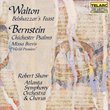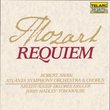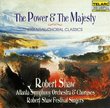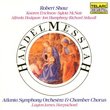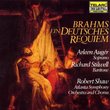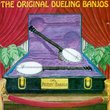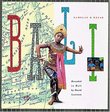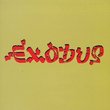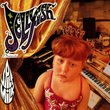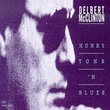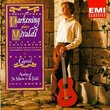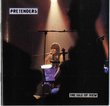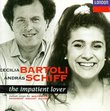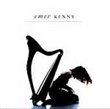| All Artists: Benjamin Luxon, Benjamin Britten, Robert Shaw, Atlanta Symphony Orchestra, Lorna Haywood, Anthony Rolfe Johnson Title: War Requiem Members Wishing: 0 Total Copies: 0 Label: Telarc Release Date: 7/24/1989 Genre: Classical Styles: Opera & Classical Vocal, Historical Periods, Early Music, Modern, 20th, & 21st Century, Symphonies Number of Discs: 2 SwapaCD Credits: 2 UPC: 089408015724 |
Search - Benjamin Luxon, Benjamin Britten, Robert Shaw :: War Requiem
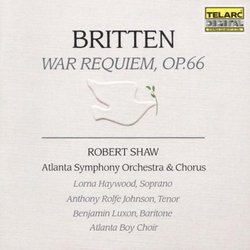 | Benjamin Luxon, Benjamin Britten, Robert Shaw War Requiem Genre: Classical
Only a conductor of Robert Shaw's experience could hope to shed new light on a score the composer himself had so convincingly presented on record. Shaw finds a meditative gentleness in the music that is new and touching, a... more » |
Larger Image |
CD DetailsSynopsis
Amazon.com Only a conductor of Robert Shaw's experience could hope to shed new light on a score the composer himself had so convincingly presented on record. Shaw finds a meditative gentleness in the music that is new and touching, and imparts a distant, sad feeling to the climaxes that deepens their ambivalence. The solo singing is on a par with that of Britten's recording--the diction is in fact better--and the choral singing is suffused with Shaw's unique magic. Telarc's digital recording is a bona fide sonic spectacular. --Ted Libbey Similar CDsSimilarly Requested CDs
|
CD ReviewsAmazing... Bass Barreltone | 07/02/1999 (5 out of 5 stars) "How to describe this piece? This is the recording that introduced me to the War Requiem. Shaw does an incredible job directing the impressive forces of the Atlanta Symphony and Chorus in this recording of the Britten masterwork. Britten uses the Latin Requiem text and augments it with the poetry of Wilfred Owen, an English soldier who fought and died in WWI to create a phenomenal work that has at its center the futility and ironiy of war. Composed shortly after WWII, this is surely one of the most important works of the 20th century. The precision of the orchestra and choruses is excellent. The only drawback is that the bass soloist is hard to understand if you aren't looking at the text." Standing O for the Ensemble, Rotten Tomatoes for the Soprano Bass Barreltone | Phoenix, AZ United States | 05/05/2000 (4 out of 5 stars) "(This review is a critique of the recording, not of the work.)Superlatives fail upon hearing the chorus in this recording. Shaw's will surely remain the definitive American version of Britten's masterwork well into this century. However, since it is far easier to criticize than to praise, I will say this: I do not understand the logic by which Shaw chose his soloists. Above all, the soprano, Lorna Haywood, whatever her credentials, should not have been the soloist for this recording. She sings with far too much vibrato, her tone is hair-raising, and her pitch accuracy leaves a great deal to be desired. Her experience as soloist is primarily operatic; perhaps this is where Shaw made his mistake.Britten wrote quite a few operas, it is true. However, he developed his composition technique as a composer of choral literature. The "War Requiem" is a choral work, not an opera. For his own recordings, even of the operas, Britten chose sopranos with minimal vibrato and perfect accuracy; there is no indication that a "Wagnerian" sound is appropriate in any of his works. What is more, this work is born of the Anglican Church tradition, which prizes above all other soprano voices the purity of the boy soprano.If you are not convinced, you have only to listen to the opening melismas of the Sanctus, which are ghastly when they should be angelic.My beef with the other soloists is less severe; the tenor and baritone are accurate in terms of pitch, so it's easier to forgive them. I must ask, however, if the producers were ever able to retrieve the frog from the back of Mr. Luxon's tongue. Listening to "Be slowly lifted up," I was fantasizing about how much better it would sound with Thomas Allen, Dmitri Hvorostovsky, or Bob Dylan, or anyone who can produce a decent "a" vowel. As for Mr. Johnson, the tenor: yes, he sounds enough like Peter Pears to pass for a "Britten Tenor," but this is not enough. His passion sounds overrehearsed. I suspect he listened to Britten's recording a few too many times, and lost his own interpretation. I feel almost no emotion from him. While his diction is clear, it detracts from the stark beauty of Britten's vocal lines. Since it is unlikely that The Great Robert Shaw would make such a mistake, I believe (and this is only a theory!) that the origin of the soloist problem may lie in the recording situation. The soloists are clearly singing at the tops of their lungs at all times. True, this is more authentic, since live performances do not use microphones. However, I, for one, do not object to soloists singing in a sound box or directly into a microphone, if it improves the quality of their singing. I wonder how much better the tenor solos would sound if they contained other dynamics than forte and fortissimo.So, for those of you seeking to make a purchase, I suggest the following: buy this one for the chorus and the orchestra sections, but interpolate other recordings as you listen to the solo sections." This is an amazing CD 04/25/2002 (4 out of 5 stars) "This was the CD we were issued at the campus bookstore for the class on Britten's War Requiem but our professor insisted we listened to the original Britten/Pears version in class. Personally I like this version better. Yes, if i had my way, i would change a few things about the piece, but Robert Shaw did a brilliant job...and I like the soprano a lot more than the other versions we have listened to! The original Russian Soprano (her name is too long to type) is just so horrible...she has this muffled quality to her that makes me so upset and I feel, brings the entire piece down. The Lacrymosa in the Dies Irae sung by this soprano on the CD is so brilliant, I am always moved...so This CD is great if you're starting out and haven't heard the Requiem before...it's now my favorite CD and I can't stop listening to it."
|

 Track Listings (3) - Disc #1
Track Listings (3) - Disc #1